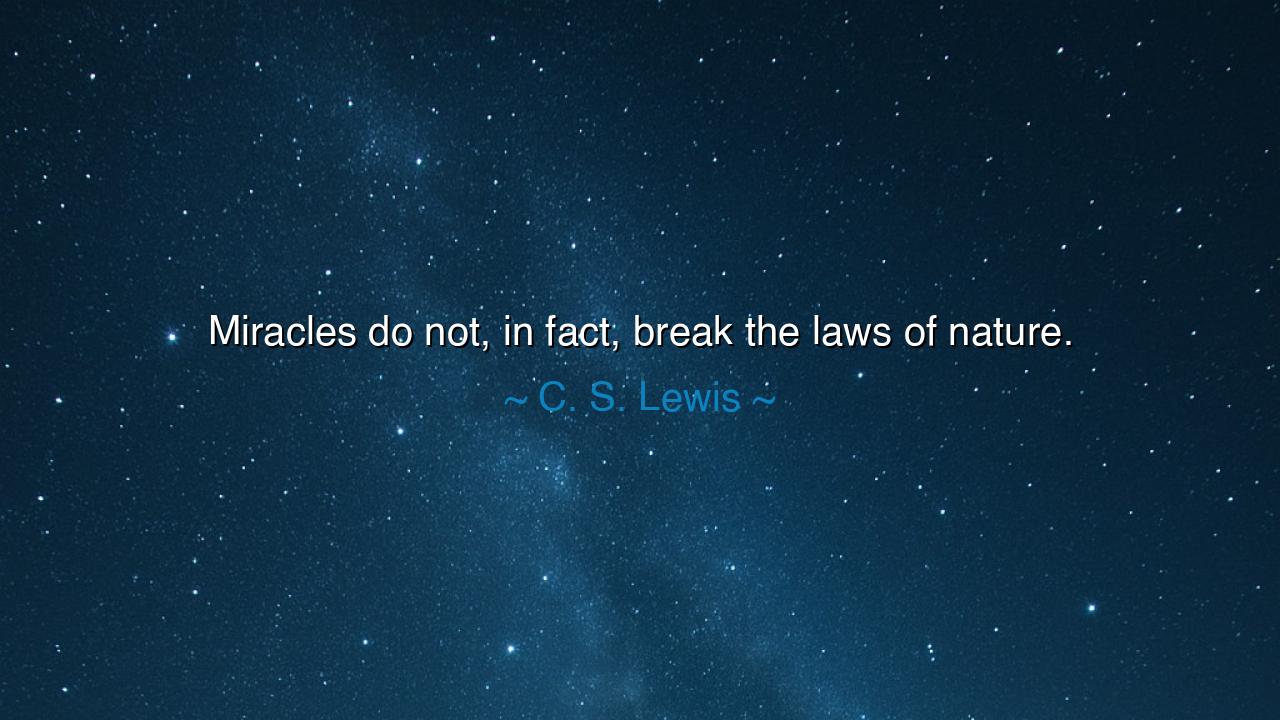
Miracles do not, in fact, break the laws of nature.






Hearken, children of wisdom, to the words of C. S. Lewis, who proclaimed with quiet reverence: "Miracles do not, in fact, break the laws of nature." In these words lies a meditation on the harmony of the divine and the natural, the coexistence of wonder and order, and the profound understanding that the extraordinary is not a rebellion against reality, but a deeper manifestation of it. Lewis teaches that the miraculous is woven into the fabric of existence, not separate from it, and that awe need not contradict reason.
The essence of this teaching is the recognition that miracles are not chaos, but revelation. They illuminate the hidden potential within the ordinary, unveil the beauty and purpose already embedded in creation, and awaken the mind and spirit to truths unseen. The laws of nature are not broken; rather, they are transcended in awareness, revealing patterns, connections, and possibilities that were always present, yet unnoticed by those who lack perception or faith.
History offers many examples of such miraculous harmony. Consider the life of Louis Pasteur, who discovered the principles of germ theory. At the time, his work was revolutionary—seemingly miraculous to those who witnessed the rapid eradication of deadly diseases—but he did not violate nature; he unveiled truths hidden within its laws, showing that what seemed miraculous was actually the fruit of careful observation, reasoning, and courage. Lewis’ words remind us that miracles are often the unveiling of natural order in ways we have yet to perceive.
In a spiritual sense, the miraculous often appears in moments of grace, insight, or transformation. The conversion of St. Paul on the road to Damascus seemed a disruption of the ordinary, yet it did not destroy the natural world; it revealed the profound capacity of human consciousness to be touched, redirected, and awakened. The miracle lay not in defiance of nature, but in the alignment of spirit with divine truth, a subtle and profound intervention that obeys the deeper laws of existence.
Lewis’ insight also calls for humility before the unseen architecture of reality. We are not masters of the universe, yet we may participate in its unfolding through perception, courage, and virtue. To witness a miracle is not to witness a violation, but to recognize the extraordinary potential hidden within the ordinary. In this way, faith and reason are reconciled: the miraculous does not demand the abandonment of understanding, but its expansion.
From this reflection emerges a lesson for life: cultivate perception, patience, and openness. Observe the world with reverence, seek understanding, and remain alert to the hidden workings of nature and spirit. Miracles appear not as spectacles beyond comprehension, but as opportunities to perceive the depth, intelligence, and harmony of the world around us.
Practically, one may act by seeking the extraordinary within the ordinary. Engage with challenges not as disruptions, but as invitations to discover latent possibilities. Nurture insight, gratitude, and attentiveness, for these qualities allow the miraculous to be recognized, honored, and integrated into life. In doing so, one participates in the revelation of the hidden wonders of creation, obeying both reason and reverence.
Thus, let this teaching echo through the generations: miracles do not break the laws of nature; they illuminate them. The extraordinary and the natural are not enemies, but partners in the unfolding of truth. By cultivating awareness, understanding, and openness, the soul may witness wonders without doubt, marvel without fear, and live in harmony with the grandeur inherent in the world and in ourselves.






AAdministratorAdministrator
Welcome, honored guests. Please leave a comment, we will respond soon